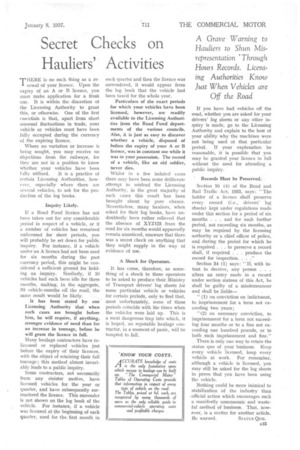Secret Checks on Hauliers' Activities
Page 29

If you've noticed an error in this article please click here to report it so we can fix it.
THERE is no such thing as a re newal of your licence. Upon the expiry of an A or B licence, you must make application for a fresh one. It is within the discretion of the Licensing Authority to grant this, or otherwise. One of the first essentials is that, apart from short seasonal fluctuations in trade, your vehicle or vehicles must have been fully occupied during the currency of the expiring licence.
Where no variation or increase is being sought, you may receive no objections from the railways, for they are not in a position to know whether your vehicles have been fully utilized. It is a practice of certain Licensing Authorities, however, especially where there are several vehicles, to ask for the production of the log books.
Inquiry Likely.
If a Road Fund licence has not been taken out for any considerable period in respect of a vehicle, or it a number of vehicles has remained unlicensed for short periods, you will probably be set down for public inquiry. For instance, if a vehicle under an A licence had not been used for six months during the past currency period, this might be considered a sufficient ground for holding an inquiry. Similarly, if 10 vehicles had each been idle for three months, making, in the aggregate, 30 vehicle-months off the road,. the same resnit would be likely.
It has been stated by one Licensing Authority that when such cases are brought before him, he will require, if anything, stronger evidence of need than for an increase in tonnage, before he will grant the licence in full.
Many haulage contractors have relicensed or replaced vehicles just before the expiry of their licences, with the object of retaining their full tonnage; this method almost invariably leads to a public inquiry.
Some contractors, not necessarily from any sinister motive, have licensed vehicles for the year or quarter, and have subsequently surrendered the licence. This surrender is not shown on the log book of the vehicle. For instance, if a vehicle was licensed at the beginning of each quarter, used for the first month in each quarter and then the licence was surrendered, it would appear from the log book that the vehicle had been taxed for the whole year.
Particulars of the exact periods for which your vehicles have been licensed, however, are readily available to the Licensing Authorities from the Road Fund departments of the various councils. Also, it is just as easy to discover whether a vehicle, disposed of before the expiry of your A or B licence, was in constant use white it was in your possession. The record of a vehicle, like an old soldier, hever dies.
Whilst in a few isolated cases there may have been some deliberate attempt to mislead the Licensing Authority, in the great majority of such cases this result has been brought about by pure chance. Nevertheless, many hauliers, when asked for their log books, have undoubtedly been rather relieved that the absence of X.YZ123 from the road for six months would apparently remain unnoticed, unaware that there was a secret check on anything that they might supply in the way of evidence of use.
A Shock for Operators.
It has come, therefore, as something of a shock to these operators to be asked to produce their Ministry of Transport drivers' log sheets for some particular vehicle or vehicles for certain periods, only to find that, most unfortunately, some of these periods coincide with the times when the vehicles were laid up. This is a most dangerous trap into which, it is hoped, no reputable haulage contractor, in a moment of panic, will be tempted to fall.




























































































